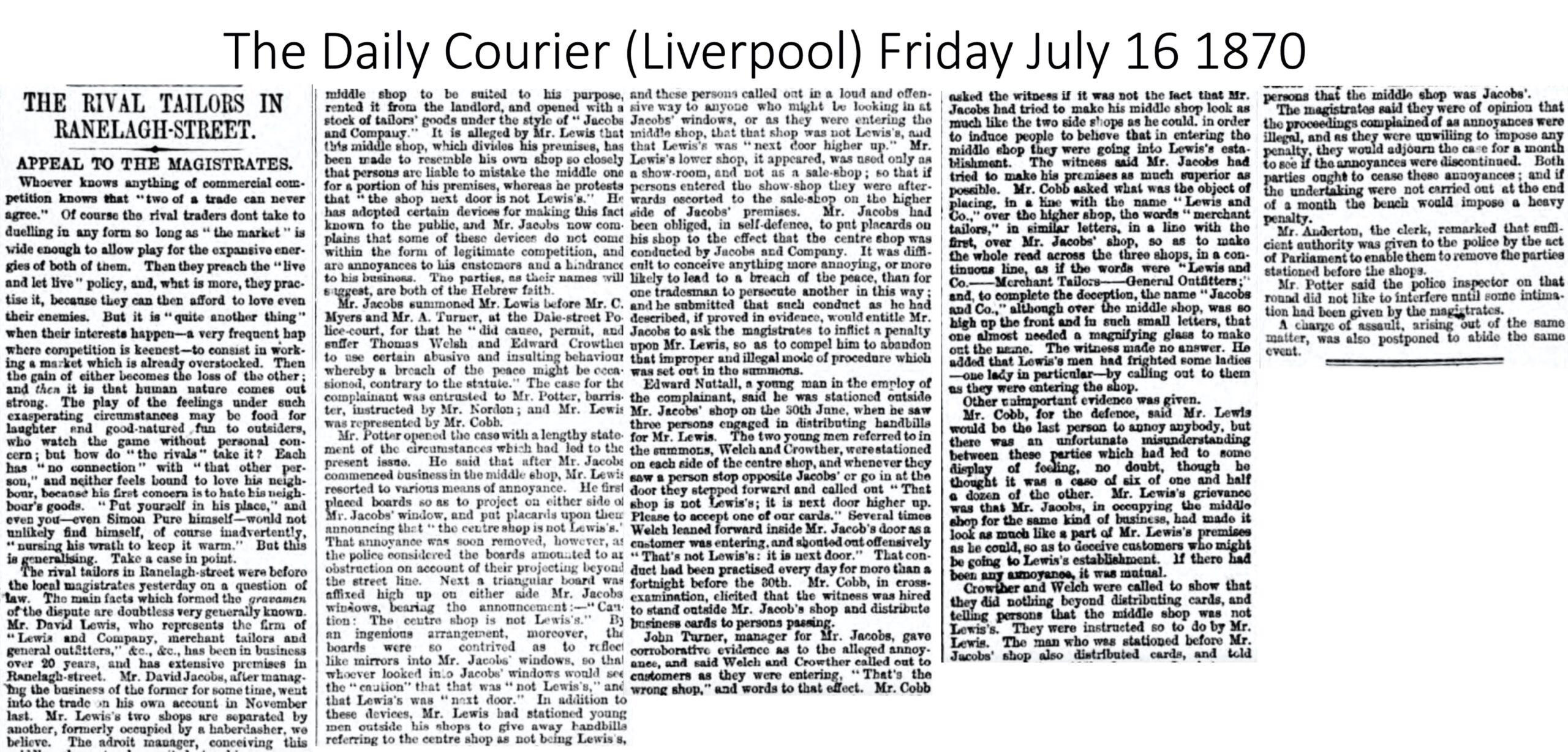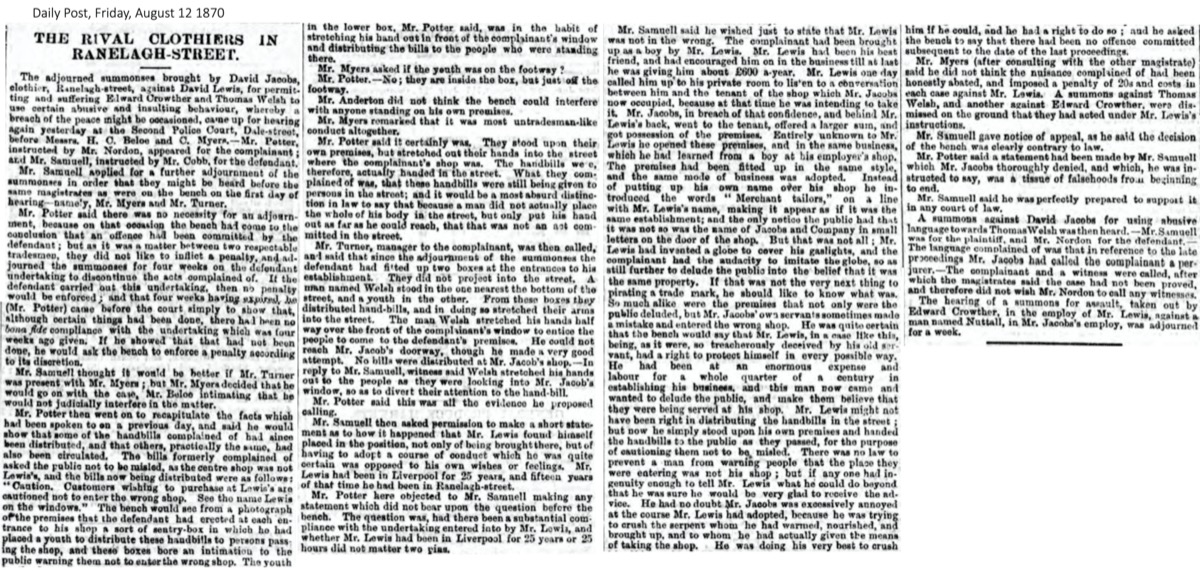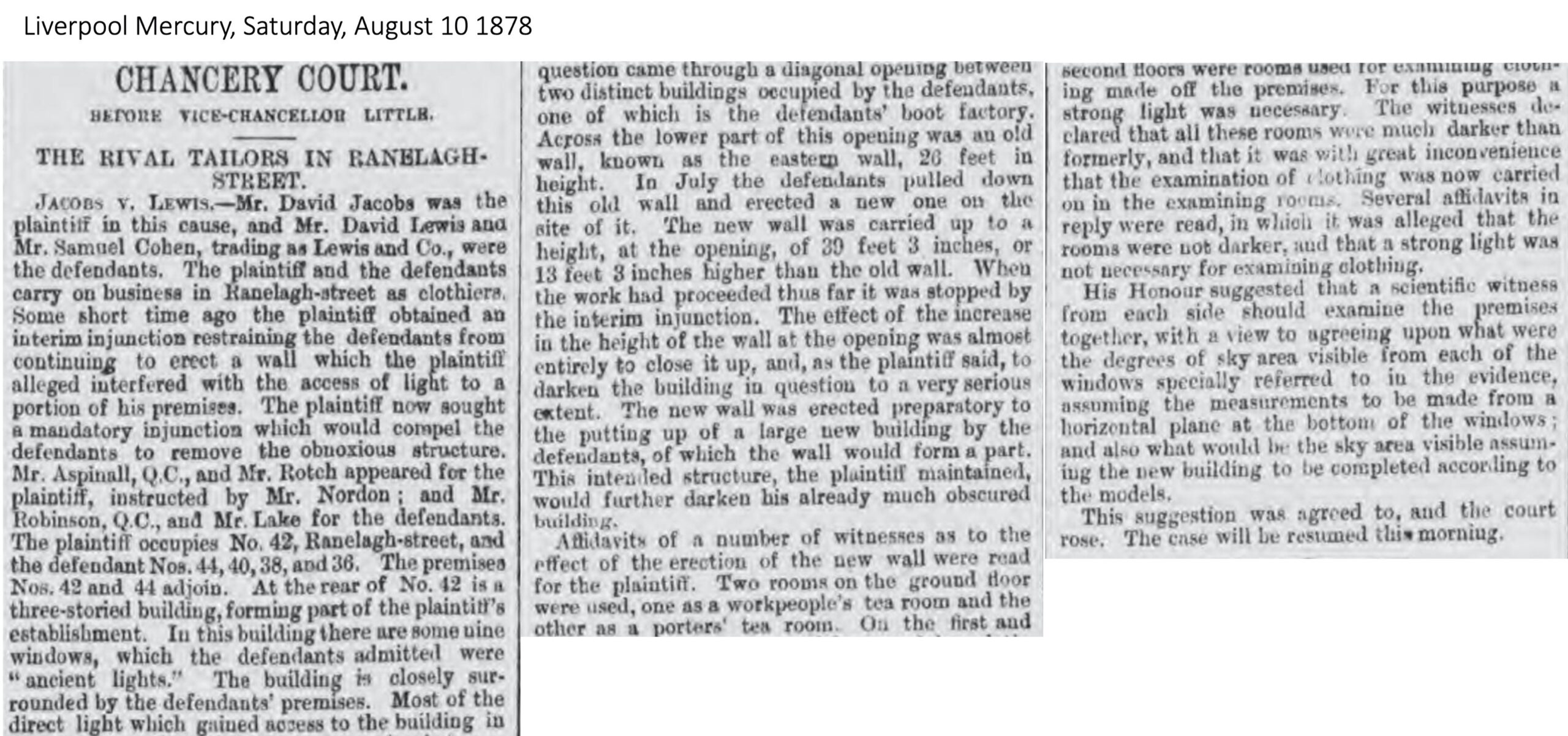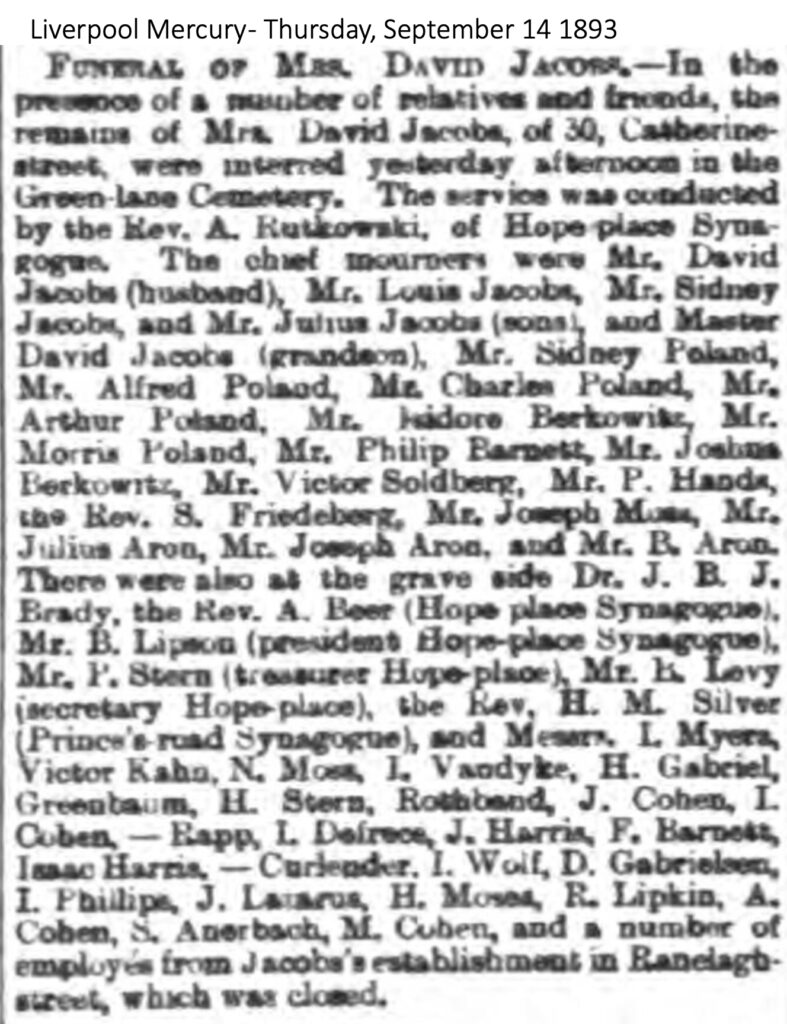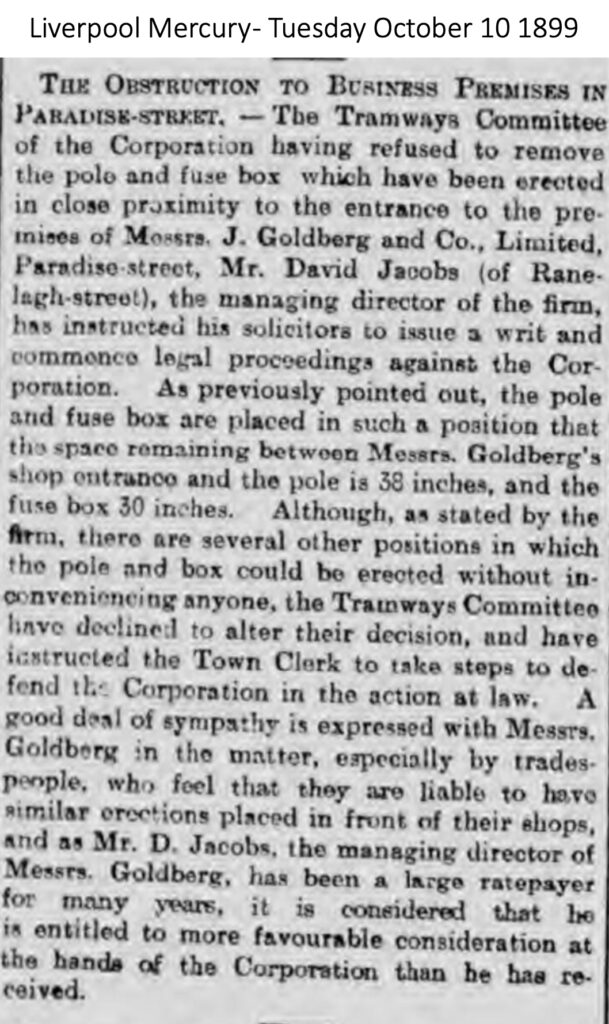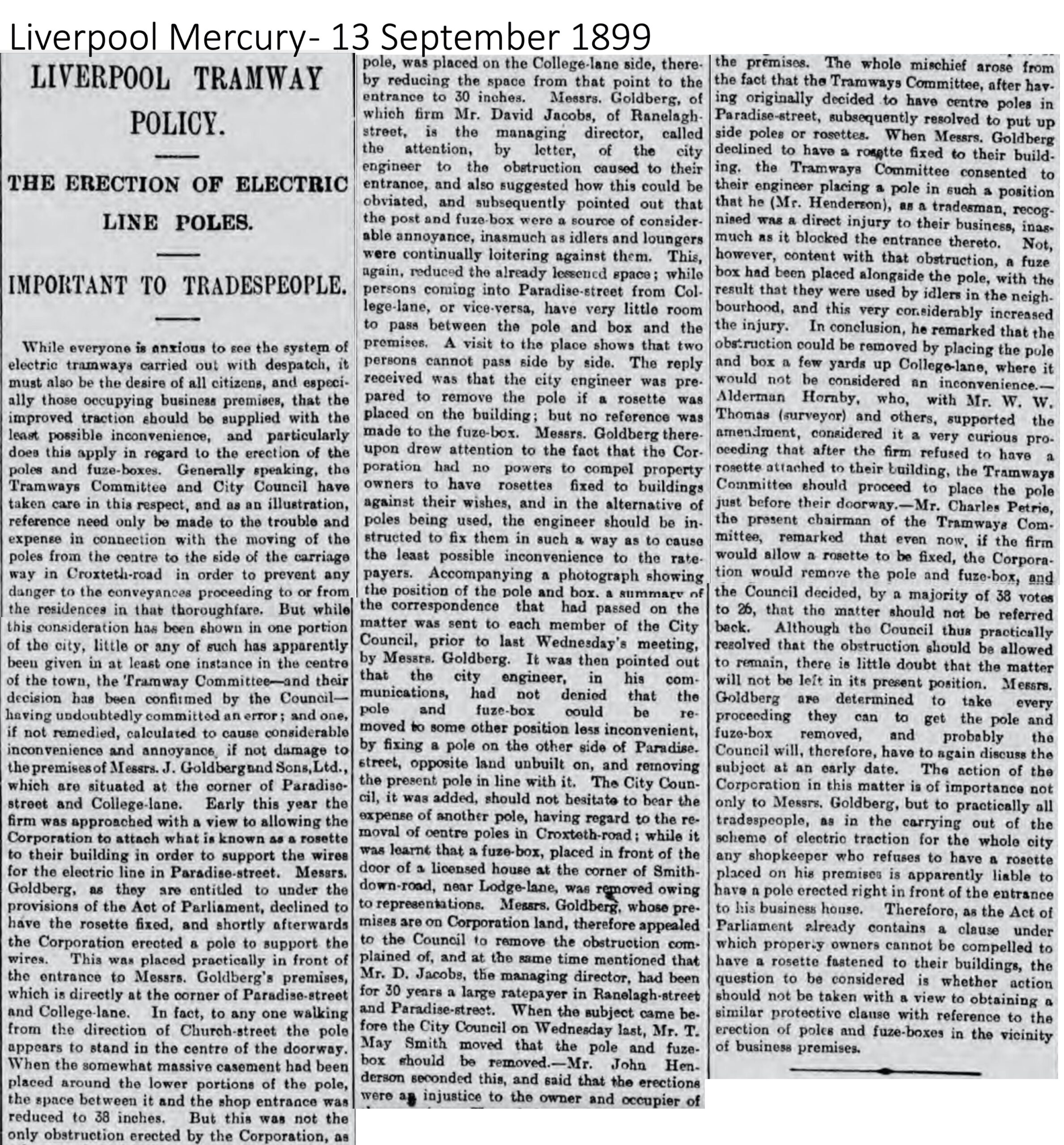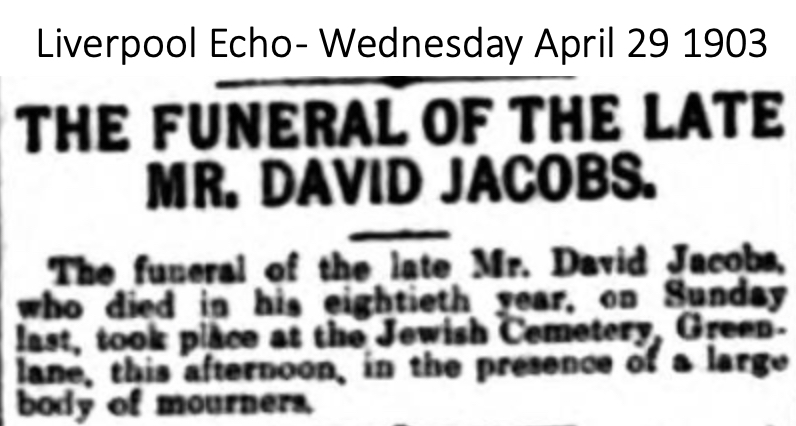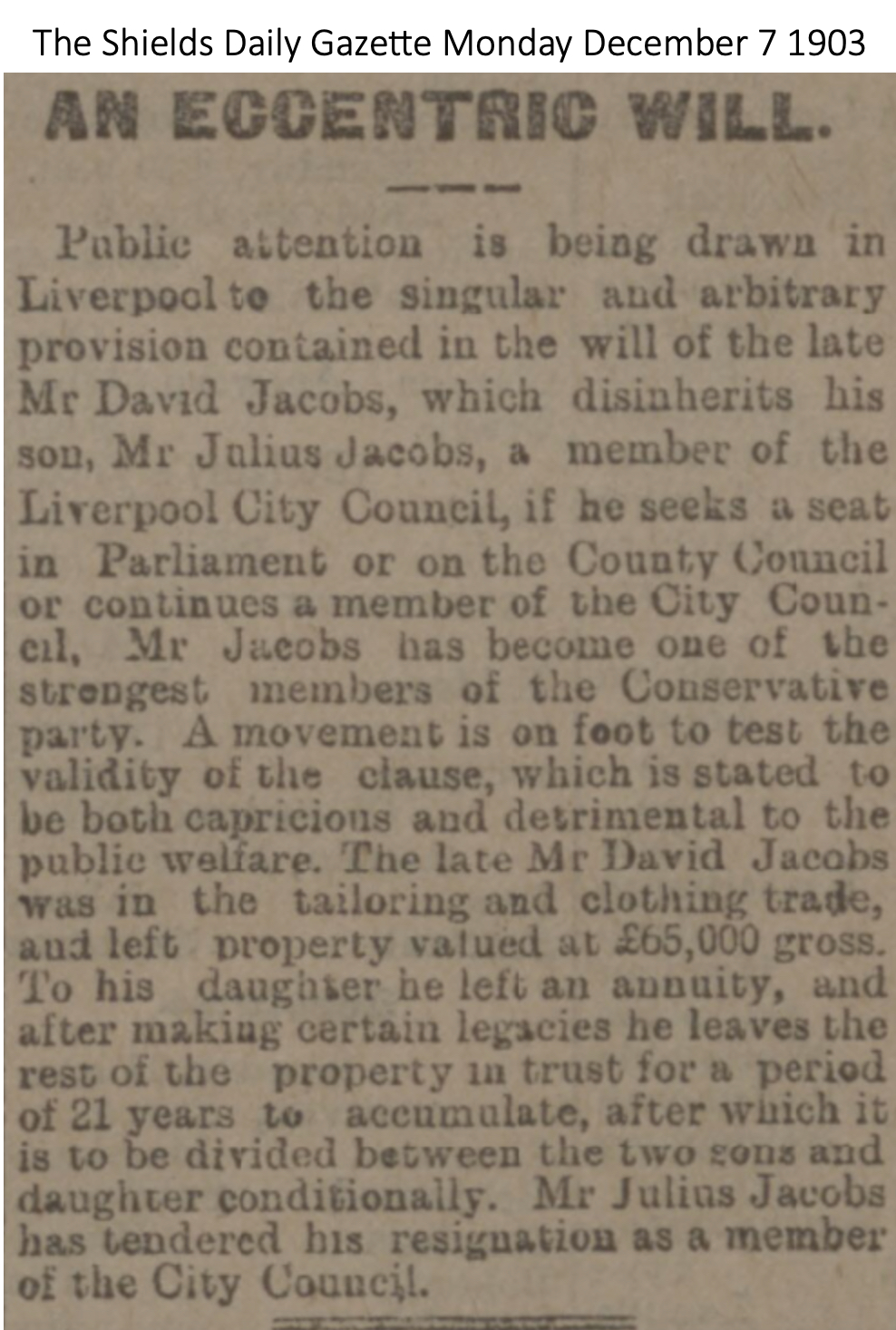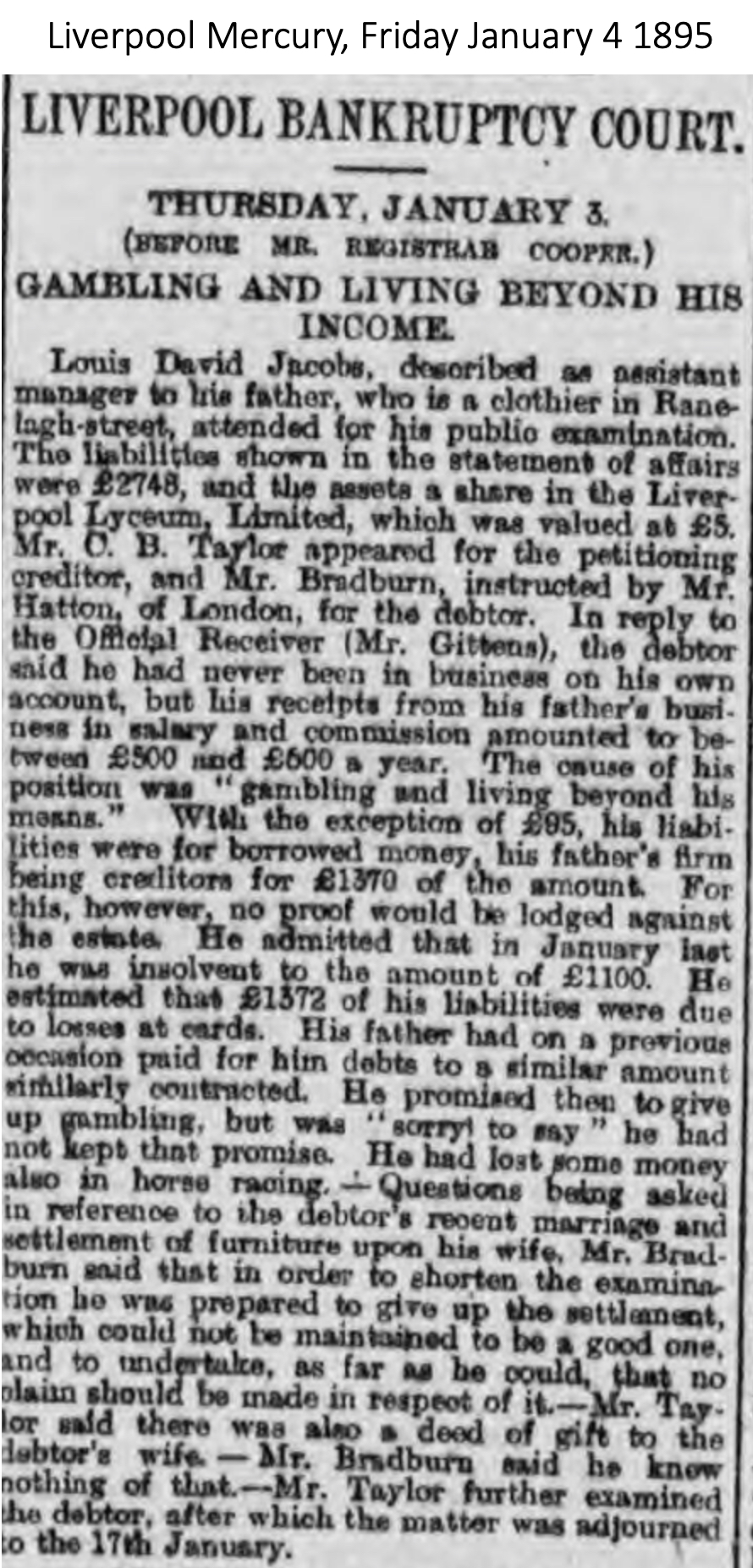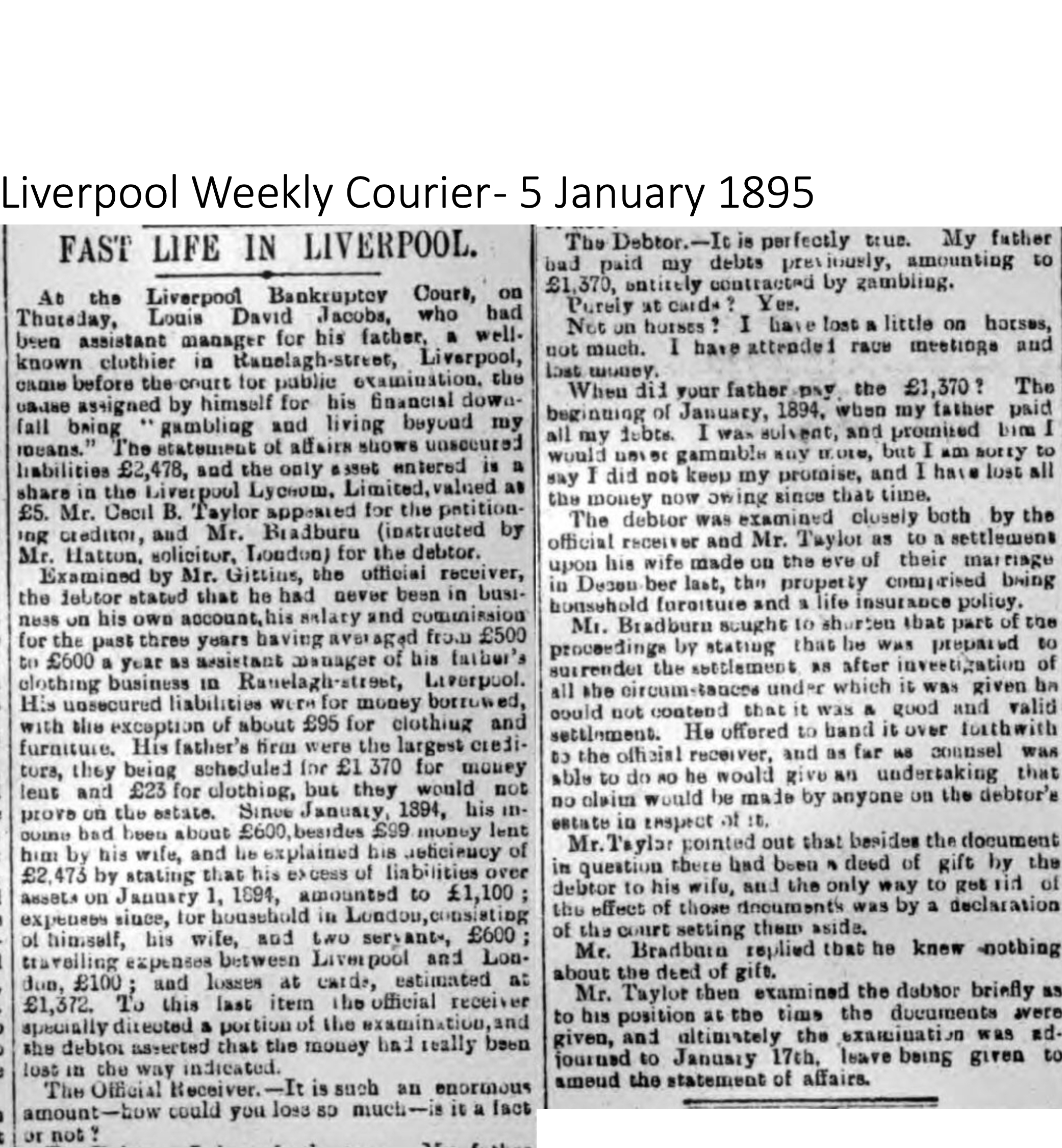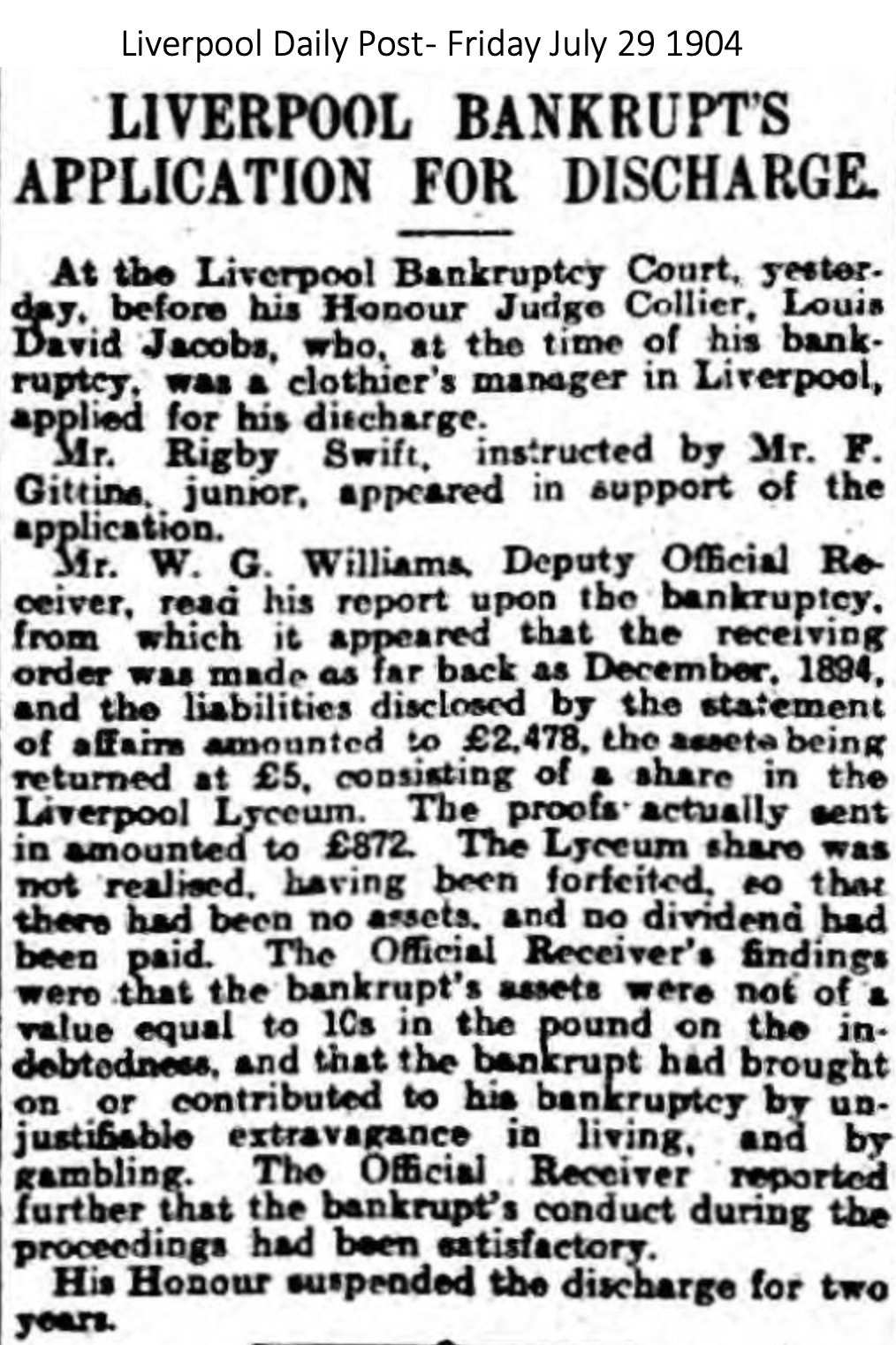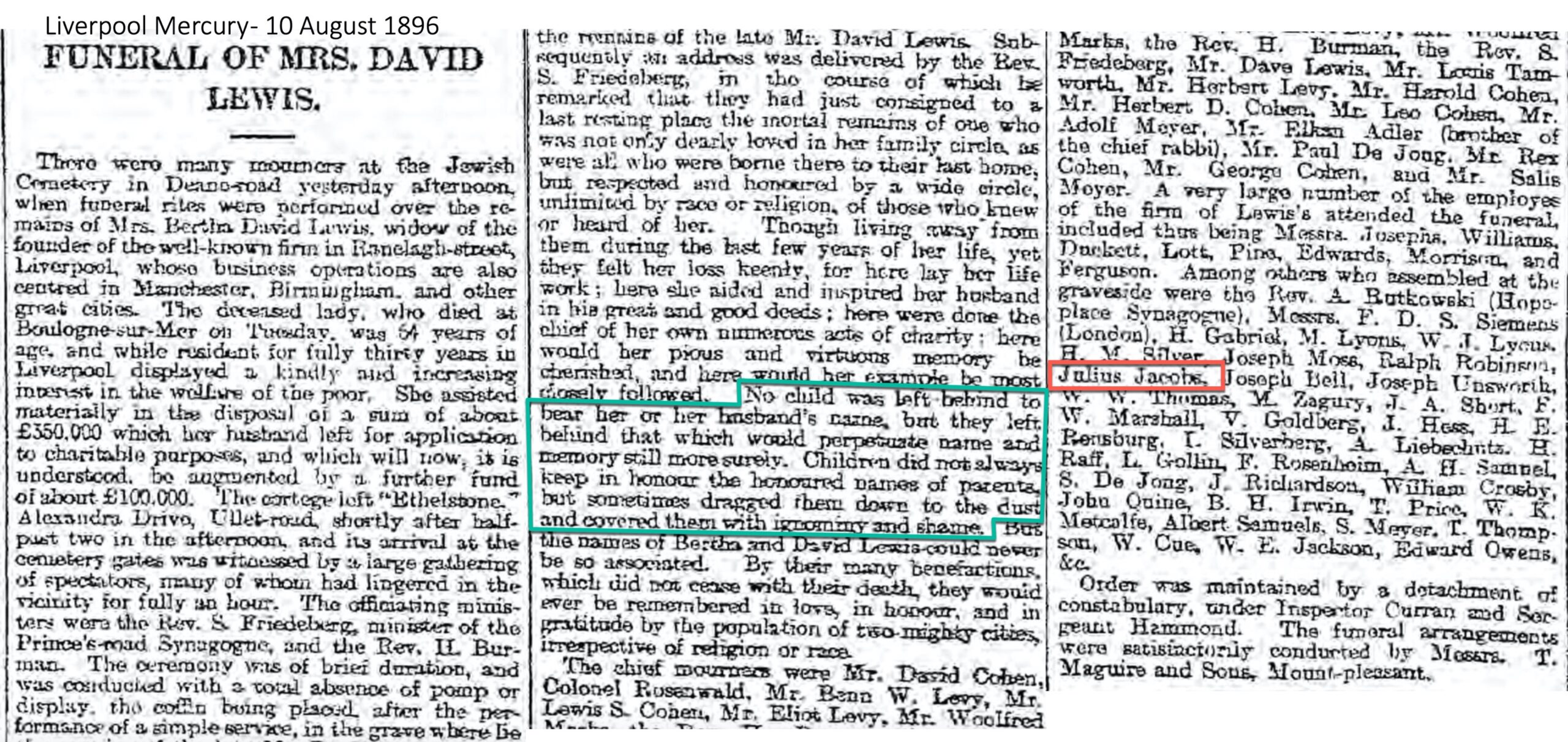David Jacobs (c. 1826 – 1903)
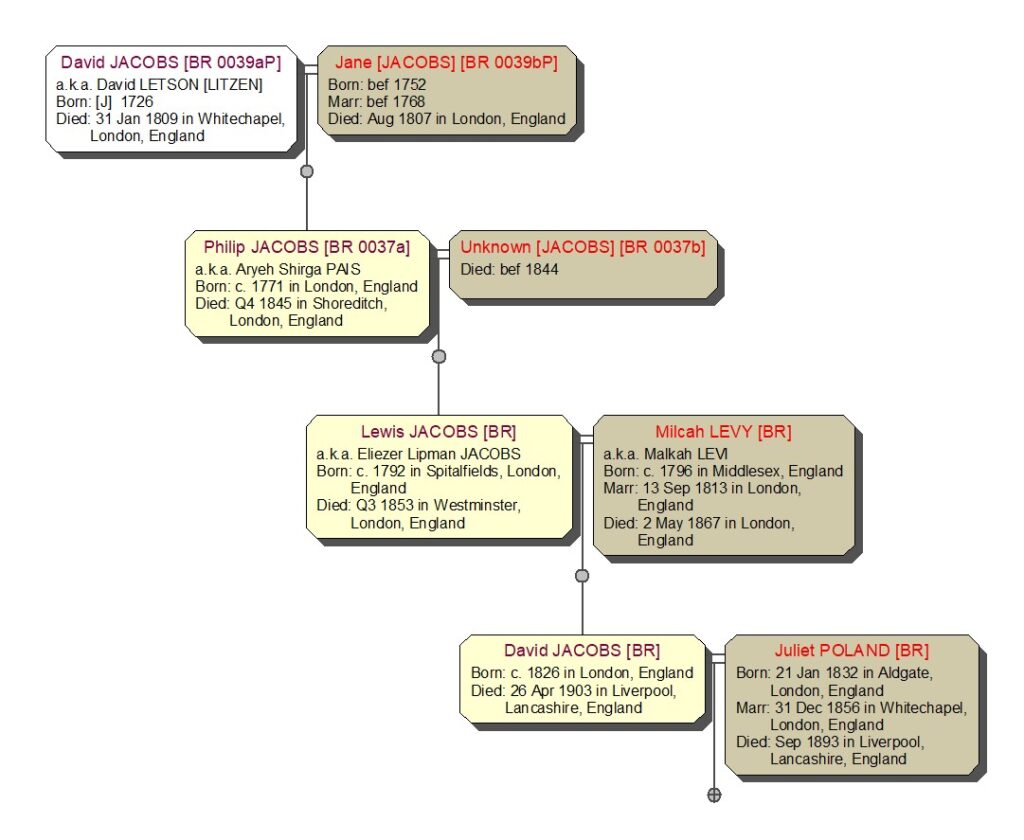
Firstly, my thanks to Peter Crook who switched me on to David as part of a conversation regarding David’s son Sydney. Peter has also provided much of the information used to write this article.
David was the 3rd son of Lewis Jacobs and Milcah Levy and to date appears to have been the most successful of all our Jacobs clan.
Where possible I have provided source references, but I have no doubt that the information where I can’t, as yet, provide sources, is essentially correct.
We first come across him in the 1841 Census where he is living with his parents and siblings in Westminster. Aged 15 he listed as a Glass Dealer like his father.[1]
The next time I find him is in 1856 when he marries Juliet Poland, daughter of Joshua Poland, a fish merchant.[2]
So where has he been in the meantime? I couldn’t find him in the 1851 census – but that alone is not unusual for members of the Jacobs family.
The answer is Dublin. All three of David’s sons were born in Dublin.[3]
By 1863 he has moved from Glass Dealer to tailoring. In 1863 he is living in Dublin and is listed as Manager of Hyams’ Tailoring Establishment.[4]
Looking at a newspaper entry of January 1864 we find David leaving Hyams after 13 years’ service. This puts his arrival in Dublin at around 1851, which would explain why I can’t find them in the 1851 census.[5]
From this point onwards, much of the information comes courtesy of Peter Crook.
David Jacobs, along with a man called David Lewis, whose name was originally Levy, had been trained and employed by Benjamin Hyam. Mr Hyam had sent David Lewis to Dublin to help establish a new shop there. The performance of that shop turned out to be disappointing, so David Jacobs was sent to Dublin by Mr Hyam in order to sort out the problems. David was successful and was appointed manager of the Hyam shop in Dublin.
David Lewis had parted company from Mr Hyam and sent up his own shop in Liverpool in competition with Mr Hyam. At some stage Mr Lewis decided to appoint a manager for his shop in Liverpool and he approached David Jacobs. According to “Jacobs Budget”6 there was a promise that David Jacobs would eventually be made a partner in Lewis’s with a view to taking the business over6.
David Jacobs accepted the offer to become manager of the Lewis’s store in Liverpool. However, Mr Hyam then offered to make David Jacobs a partner in the much larger Hyam business, in an attempt at retaining his services.
David Jacobs felt honour bound to abide by his acceptance of David Lewis’s offer and so he moved with his family to Liverpool, becoming manager of Lewis’s.
They lived at 7 Chatsworth Street/Terrace, Wavertree, Liverpool.5
Subsequently David Jacobs discovered that David Lewis was planning to bring his nephew into the business and that the nephew’s family would be developing the Lewis’s business.
So David Jacobs acquired premises next door and resigned as manager of Lewis’s. David Lewis made David Jacobs work out 3 months’ notice.
The two David’s then set about buying up leases on various premises in Ranelagh Street whenever the opportunity presented itself.
When the situation became litigious, mediators eventually helped to arrange a negotiated redistribution of leases between the two Davids in an attempt at calming the situation down.
David Jacobs’ eldest son, Louis David, was removed from the clothing business where he had been a senior manager. He had been trained as a boot maker and had been in charge of that part of the business.
There were some serious issues with Louis David’s lifestyle which caused David to remove him from the Jacobs business – more on this later.
The Jacobs business occupied a prestigious plot on the corner of Ranelagh Street in Liverpool. Lewis’s was just round the corner also on Ranelagh Street as can be seen in the photograph below:
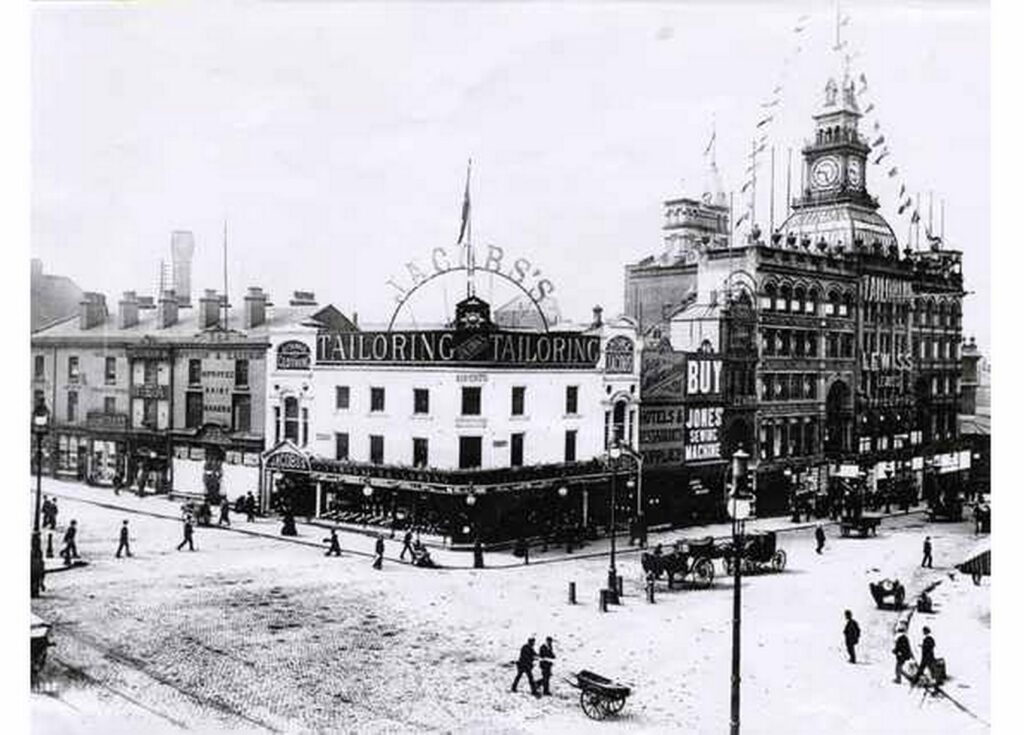
Source: Liverpool Echo
David wrote a witty book entitled “Jacobs Budget”[6]. There is a copy of it in the British Library. The book description is somewhat misleading:
“Title: Jacobs’s Budget, containing portraits and biographies of thirty eminent statesmen, military and naval heroes, etc.” Link to British Library Catalogue
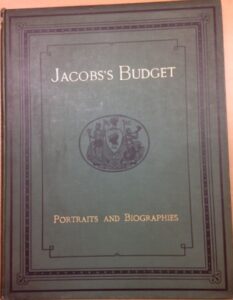
Peter Crook has seen a copy of the document and comments as follows:
Although the description of this book focusses on images of suits worn by important people it is full of amusing articles. For example, David Jacobs claimed to have been responsible for Turkish people starting to wear western clothes. The superb tailoring of Jacobs’s of Ranelagh Street came to the attention of “The Sultan of Istambol” who commissioned a made to measure suit. He was very pleased with the smart 3-piece suit and started wearing it instead of his traditional robes. Jacobs had told him that one of the benefits of Jacobs’s suits was that wearing them made men feel “seedy”. The Sultan discovered that this effect was indeed correct and also that the Jacobs clothing made him more appealing to his harem. When male members of the Sultan’s court heard about this effect, they all wanted to wear Jacobs suits etc etc!
From our point of view, there is a section near the end of the book which describes the history of Jacobs and David’s disagreement with David Lewis (AKA David Levy) although (for legal reasons) he did not mention him by name.
It includes a section about the events that led to David Jacobs falling out with David Lewis (AKA David Levy) and for Jacobs’s of Ranelagh Street being established next door to Lewis’s and in direct competition. Part of the problem was that Lewis’s “doormen” used strong arm tactics to prevent shoppers from entering Jacobs and forcing them to shop next door at Lewis’s. There are entertaining newspaper reports of these events.
Lewis’s “doormen” had erected, on the pavement, what were described in court as “pulpits”, which these unpleasant individuals used for spotting would be shoppers. They used young boys as runners to keep tabs on everything. Notices appeared in Lewis’s window advising shoppers not to go next door. The police seem to have finally become involved when a lady of some financial status was on her way to enter Jacobs when her son was propelled into Lewis’s.
Click to see newspaper cutting [Daily Courier 1870.07.16]
Litigation followed (in true Jacobs style) and David Jacobs was the winner.
Click to see newspaper cutting [Daily Post 1870.08.12]There was another court case between Jacobs and Lewis in 1878. David Lewis wanted to build a wall which David Jacobs said would interfere with access to light for part of his premises.
Click to see newspaper cutting [Liverpool Mercury 1878-08.10]Although only a small handful of Lewis’s stores (a well-known company in the UK) existed whilst David Lewis was alive (Liverpool, Manchester, Birmingham and briefly, Sheffield) the brand was expanded by the Cohen family and more stores added, including Selfridges.[7]
David’s wife, Juliet nee Poland died in 1893 and a report of the funeral appeared in the local press. Juliet was aged 61.
Click to see newspaper cutting [Liverpool Mercury 1893-09-14]
David’s son Julius was very active on the Liverpool City Council as well as the Freemasons.
A major, life changing problem for Julius occurred when his father had a disagreement with the City Council.
Julius held senior positions on the City Council and he had significant political ambitions. He had been an unsuccessful Conservative candidate to become an MP at a recent election.
During a weekend, workmen from the Council attached a pole with wires coming out of it onto the wall above the entrance to David’s premises in Paradise Street (the J Greenberg company). This was to do with a new programme for electric trams going along that street. It was done without any discussion with David and certainly without his permission.
When he demanded that they removed the offending and unsightly pole and wires, they did so but, in their place, they erected something much worse – something like a lamp post with lots of electric wires and which they positioned immediately in front of the entrance to the shop.
Click to see newspaper cutting [Liverpool Mercury 1899-10-10]
It seems likely that perhaps this activity, but certainly what followed, had been planned and/or exploited by political opponents of Julius.
David expected Julius to use his significant contacts within the Council and get the electrification works and lamp post/pole moved somewhere else along the road. When Julius failed to get this done, David ordered him to resign from the Council (which Julius’s political opponents would have been happy with).
However, Council rules did not permit a resignation in such circumstances. So Julius was between a rock and a hard place. He was a middle-aged man of some status in the City of Liverpool and he was being controlled by his elderly father.
Julius did actually resign from the council, but he had to pay a fine as a consequence. It must have been hard to take for someone who happened also to be Chairman of the Liverpool City Magistrates Court and who had been hoping to become the local Member of Parliament.
David then informed both Julius and Sydney that he prohibited them from having anything else to do with politics. Any failure to comply would result in being disinherited.
All of this caused much interest and amusement both locally and nationally with headlines in both the Liverpool and national newspapers.
There is no doubt that the ensuing trouble over the electric pole led to the clause about political activity in David’s will. David Jacobs had spent a lot of money on legal fees and Julius had tried to get the Council to compensate his father for this, but he was unsuccessful because of the actions of his political opponents.[8]
David Jacobs died on Sunday 26th April 1903. He was buried in the Jewish Cemetery, Green Lane, Liverpool.
Click to see newspaper cutting [Liverpool Echo 1903.04.29]
After David Jacobs’ Death
In his will Julius and Sydney inherit the business, but only subject to strict conditions. These including forbidding them to be members of the council or a Member of Parliament.
Click to see newspaper cutting [Shields Daily Gazette -1903-12-07]
There were also restrictions as to certain items they couldn’t stock.[8]
Their partnership was intended to be for their joint lives; however, there is a clause in the will that may be interpreted that there was some leeway after 21 years (not my area of expertise).
It would appear that the business was finally dissolved in 1929
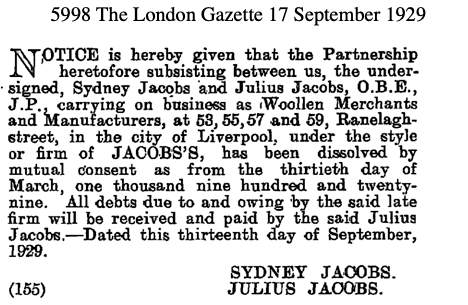
Just before his death, David added a codicil to his will, largely cutting Amy, wife of Louis David, out of it. After Louis David had died in hospital from injuries suffered when he was run over, his son, Sydney, seems to have become close to Amy and to her children. This is evident in Sydney’s will.
David Lewis had been in poor health, which could have been part of the earlier problem over succession and he died some years before David Jacobs, leaving his business and numerous charities to the Cohens.
Following David’s death Julius seems to have tried to establish some sort of cordiality with the next generation of Cohens and indeed the Jacobs business was eventually sold to them.
Just as an aside, Julius was awarded the OBE and was a Justice of the Peace.
Louis David Jacobs
As mentioned above, the relationship between Louis David and his father was not an easy one.
Sometime before 1891, Louis became involved with a woman called Amy Esther Hill.[9] [10]
Interestingly, if we look at the 1891 census, we find Amy with her parents and siblings. However, there are 3 young children in the household whose ages seem a little out of place with the rest of her siblings. One of them is an Arthur H Hill age 510. This is only supposition on my part, but could at least one of these children be hers?
Amy was an actress from Liverpool but working in London. Louis David had been spending a lot of time in London, away from the business, in order to be with Amy. Louis David did not initially marry Amy, who has been baptised in a Church of England church, presumably because he was aware of the likely consequences.
Amy had at least 4 illegitimate children by Louis David before they married in 1894.[11]
In 1897 David invested £2,500 in £1 shares in the business of J Goldberg & Son Limited, Wholesale Tobacconists Warehousemen (the business was at Nos. 41 & 43 Paradise Street, Liverpool). David was Acting Managing Director until about 1901, and then acquired £500 of debenture stock in the same business. His sole object was to obtain for his son, Louis David, the position of Manager of the Office Department, which he did.11 At the time the original will was written this was still the case.
Louis David and Amy had moved into a house in Liverpool (which I think may have been owned by David).
However, they eventually got married in 1894 and moved to the south east, where Louis David started working on his own account as a tobacco and cigar salesman. David disinherited Louis David.
David had cut Louis David out of his will, but he established a trust so as to provide for the grandchildren. An added problem for David was that Louis David had a serious gambling problem and became bankrupt several times, including after he had been living in the south east. David had kept paying off Louis David’s debts.
There are numerous newspaper entries which relate to it, a sample are listed below.
Click to see newspaper cutting [Liverpool Mercury – 1895-01-04]
Click to see newspaper cutting [Liverpool Weekly Courier 1895-01-05]
Note that this following clipping is the year after David Jacobs died.
Click to see newspaper cutting [Liverpool Daily Post 1904-07-29]
There was a snide, oblique reference to David’s problems with his sons, in something that was said (and published in the newspapers) at the funeral of David Lewis’ widow Bertha Cohen. The gist of it was that although David and Bertha Lewis (nee Cohen) had not been blessed with children, they had been spared the embarrassment that parents can be subjected to by the behaviour of their sons. (i.e. gambling, fathering of illegitimate children, marrying outside the Jewish faith, sibling litigation, messy and well publicised divorce with sordid details etc – this last was a reference to David’s son, Sydney). However, it would appear the David Jacobs’ son, Julius attended. It is mentioned elsewhere in this document that Julius tried to build bridges with the Cohen family who took over.
Click to see newspaper cutting [Liverpool Mercury – 1896.08.10]David’s Will Click to view David Jacob's Will
When David dies in 1903 the will is probated with a value of £65,000 which in today’s money (2021) equates to about £8,000,000 – estimates vary, but this does make him very rich.
In 1901 David drew up his original will on the 13th November, a codicil was added at later date (the copy that I have doesn’t have a date for the codicil)8
The will that I have is an official transcript typed up for the divorce of his son Julius and runs to 18 pages.
His will makes very interesting reading from both a social point of view and definitely from a Genealogical one.
The genealogical aspect come from the number of bequests to named individuals and their relationship to him and his family.
Notable by its absence is any bequest to his eldest son, Louis David, who had apparently ‘married out’ to a Christian – as was be covered in more detail earlier.
From a social point of view we note that his two other sons, who inherited his business interests, were forbidden from becoming a Member of Parliament, County or Council, Additionally They shall not add such business as Ladies drapery silk Mercery or Mantle trading.
Where he left bequest to girls or ladies who were, at the time of his death, spinsters, the bequest was generally restricted see this example: ‘in case she shall be a Spinster at my death to be payable on her marriage in case she shall marry a man professing the Jewish Religion within ten years from my death or at the expiration of such ten years in case she shall then be a spinster’.[12]
Similar conditions were specified with bequests to other unmarried female relatives.
In the original will, whilst there was no bequest to his son Louis David, there is a fund set up in his name with benefits payable to Loui David’s wife Amy Esther Jacob for the rest of her life. After her death the income shall be used to help any children of Louis David and Amy who is under the age of 21.13 However this was revoked in the codicil.16
In August 1897 David invested £2,500 in a business called J Goldberg & Son with the express purpose of becoming Managing Director and thereby get his son Louis David the position of Manager of the Office Department.
His grandson, Isidore Berkowitz, was appointed trustee to look after the shares and the income from this investment..[13]
In addition to any income from the trust fund, David bequeaths an annuity of £100 to be paid to Amy Esther Jacobs for five years and if she dies before then, to help educate her children.
Juliet Amelia Jacobs, Stanley Jacobs Arthur Jacobs and David Jacobs, children of Louis David & Amy Esther are given a bequest in their own right.[14]
The codicil to the will makes some considerable changes.
David has disposed of his shares and debentures in J Goldberg & Son and therefore revokes Clause 13 of his original will, meaning that the Louis David Fund will not be set up and therefore Louis David’s wife will not benefit from it.[15]
Further, he revokes the 5-year £100 annuity to Amy Esther Jacobs[16]
However, by my reading, this still leaves Amy Esther with an income from the Redemption Fund (which is separate from the Louis David Jacobs Fund),15 and the separate bequests to her children[17].
[1] 1841 Census – HO 107/0737 B07 F24 P43
[2] BMD Index – 1856 OND Strand 1b 611
[3] Louis David Jacobs (1857), Sydney Jacobs (1859), Julius Jacobs (1861)
[4] Thom’s Irish Almanac – Dublin, 1863
[5] Berger 1861-1870 Extracts from Jewish Newspapers
[6] “Jacobs Budget’” by Jacobs, David
[7] https://en.wikipedia.org/wiki/Lewis%27s
[8] David Jacobs’ will – Clause 25
[9] Amy gave birth to Stanley Louis Jacobs in 1891 – 1901 Census – RG 13 3439 F67 P18
[10] 1891 Census RG 12-2948 F11 P43 – Amy is with her parents & siblings in Liverpool
[11] BMD Index OND 1894 Hampstead 1a 1285
[12] David Jacobs’ will – Clause 8 as an example
[13] David Jacob’ will – Clause 13
[14]David Jacobs’ will – Clause 35
[15] David Jacobs’ will – Codicil – Clause 4
[16] David Jacobs’ will – Codicil – Clause 5
[17] David Jacobs’ will – Clause 35(a) (b)


